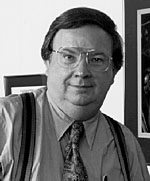Prize Recipient

Charles Vernon Shank
Lawrence Berkeley National Laboratory
Citation:"For his pioneering research accomplishments in the area of laser development and ultrafast phenomena; and for his outstanding research management leadership as Director of the Electronics Research Laboratory at AT&T Bell Laboratories in the development of quantum electronics, and as Director of Lawrence Berkeley National Laboratory for fostering industrial interactions."
Background:
Charles Vernon Shank, 51, has been Director of the Lawrence Berkeley Laboratory in Berkeley, California, since September 1989. In addition to his duties as Laboratory Director, Shank has a unique triple appointment as a professor at the University of California, Berkeley in the departments of physics, chemistry and electrical engineering and computer sciences. He graduated summa cum laude from UC Berkeley in 1965 and went on to receive his M.S. and Ph.D degrees from UC in 1969.
Following graduation, Dr. Shank joined the staff at AT&T Bell Laboratories. During his 20-year career at Bell Laboratories, he held numerous leadership positions and was Director of the Electronics Research Laboratory just before returning to Berkeley. At Bell Laboratories, he made pioneering contributions to the study of ultrafast events that occur in a millionth of a billionth of a second using short laser pulses. He contributed to fiber optic communications with the invention of the distributed feedback laser, a component in high data rate transmission systems.
Dr. Shank's tenure at Lawrence Berkeley Laboratory has included service on numerous state and national committees and councils. They include the California Council on Science and Technology, the National Critical Technologies Panel of the US Office of Science and Technology Policy, the Council on Competitiveness, the Center for Strategic and International Studies, the Solid State Sciences Committee of the National Research Council, the Environmental Technology Export Council, and the California Business-Higher Education Forum.
The scientific and service contributions Dr. Shank has received includes the R.W. Wood Prize of the Optical Society of America, the David Sarnoff and Morris E. Leeds awards of the Institute of Electrical and Electronics Engineers, the Edgerton Award of the International Society for Optical Engineering, the John Scott Award, the Edward P. Longstreth Medal of the Franklin Society, and UC Berkeley's Distinguished Engineering Alumnus Award.
He has been elected to the National Academy of Sciences, the National Academy of Engineering, and the American Academy of Arts and Sciences. He is a Fellow of the American Association for the Advancement of Science, the American Physical Society, the Institute of Electrical and Electronics Engineers, and the Optical Society of America.
